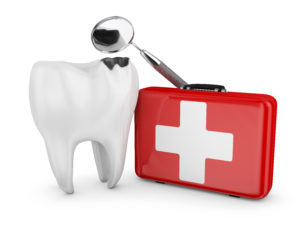 You’ve probably heard the saying, “Expect the unexpected.” Unfortunately, the “unexpected” isn’t always a positive thing – particularly when it comes to dental emergencies. In fact, it goes without saying that any sudden or severe pain in the mouth is also a pain in the neck!
You’ve probably heard the saying, “Expect the unexpected.” Unfortunately, the “unexpected” isn’t always a positive thing – particularly when it comes to dental emergencies. In fact, it goes without saying that any sudden or severe pain in the mouth is also a pain in the neck!
But not to worry – in this blog, you’ll learn how to handle four of the most common dental emergencies from an emergency dentist in The Colony. So even if you can’t always prevent an emergency, you’ll know how to handle one if it arises!
Knocked Out Tooth
If a tooth has been knocked out, it’s important to act fast. The chances of saving the tooth are much better if you can be seen within an hour! Call a dentist immediately before doing the following:
- Rinse off the tooth, making sure you only handle it by the crown, not the root.
- For teens or adults, put the tooth back in its socket, facing the right way, or in the cheek pouch. This might be a swallowing hazard for children, so instead put the tooth in a glass of milk (saliva or water work in a pinch). The most important thing is that the tooth stays moist!
- Use a clean, damp washcloth or paper towel to apply gentle pressure to the area and control any bleeding.
Broken Tooth
Whether you’ve broken a tooth or part of a filling, the first thing to do is gently rinse out your mouth.
If you aren’t in pain, you can wait until your earliest convenience to be seen, but be aware that broken teeth are very weak and may break again. In some cases, a second break can make a tooth unsalvageable.
If you are in pain, use over-the-counter pain medications until your appointment and avoid chewing on the side of the broken tooth.
Abscess or Toothache
An abscess is a sign of infection and may be the result of a deep cavity. If you suddenly develop an abscess or have any swelling, call a dentist in The Colony right away. Infections can be very dangerous if they move to other areas of the body and need to be addressed immediately.
If you simply have a toothache, you’ll also want to be seen as soon as possible. You can apply an icepack for 20 minutes at a time and use over-the-counter pain medications until your appointment.
Jaw Injury
For emergency dental situations, we usually recommend that you call a dentist first. But, if you suspect you have a broken jaw, go to the nearest emergency room to be stabilized first. Then you can schedule a dental appointment to have any restoration needs addressed.
It’s true that life likes to throw us the occasional curveball. But with these guidelines, you can do more than simply expect the unexpected – you can be prepared for it as well!
About the Author
Dr. Austin Amos is a general, restorative and cosmetic dentist who has made it a priority to provide outstanding emergency care to his patients when they need it most. As a busy father of three, he can relate to the “unexpected surprises” that life sometimes has in store and is there to help every step of the way. If you have any questions, he can be reached via his website or at (972) 625-4746.
